Article
Best Fractional CTO Statistics: UK 2025


We used AI profiling to analyse the views of 74,404 people on CTOs. Here are the latest insights into fractional CTOs and the UK’s top resources.
Our survey of business leader attitudes to the fractional CTO role is truly fascinating. Of particular interest are the findings that 27% of business leaders felt that monthly strategic input from a CTO is unnecessary, and that only 19% say that clear strategic thinking is absolutely essential. We see things very differently, and our clients are thankful for that. At Full Stack Consulting we believe that the CTO role is primarily a strategic role that is continuously offering strategic input that drives growth and business valuation uplift -- Graham Roberts, Founder of Full Stack Consulting.
As businesses across the UK navigate growth, digital transformation, and evolving tech demands, the role of a fractional CTO is becoming increasingly relevant, yet it’s still widely misunderstood.
To better understand how this role is viewed across the UK, we used AI-driven audience profiling to synthesise insights from online discussions to a high statistical confidence level. This allowed us to analyse 74,404 business leader opinions on everything from skills and support expectations to hiring preferences and business maturity over a full year, ending on June 2, 2025.
The results reveal a growing interest in part-time CTO support and key insights into what today’s companies value most in their tech leadership.
Index
-
Best Fractional CTO UK 2025: Full Stack Consulting
-
100% of our audience admits they’re not completely knowledgeable about a fractional CTO's role
-
33% are actively scaling and hiring for their company
-
For 33%, the most important CTO skill is improving infrastructure
-
100% agree they currently rely on part-time CTO support for tech leadership
-
49% strongly agree hiring qualified engineers is the biggest tech challenge
-
100% are just exploring their options for engaging a CTO
-
17% say project-based support from a CTO is essential for success
-
57% highly value CTOs' strong technical skills
-
52% prefer CTOs with a hybrid work setup and a weekly office presence
-
53% prefer using startup or tech communities to find executive talent
-
29% definitely expect CTOs to collaborate on interviews and selection when hiring developers
-
74% agree it's absolutely essential CTOs have experience in fintech or regulated tech
-
For 33%, team retention and engagement are crucial KPIs for measuring a CTO's success
-
72% say CTOs should be involved in company planning, but only for tech matters
-
Methodology
Best Fractional CTO UK 2025: Full Stack Consulting
Full Stack Consulting offers tailored fractional CTO services for UK startups, scaleups, and SMEs, delivering high-impact technology leadership without the cost of a full-time hire. Founded in 2014 by Graham Roberts—an experienced full stack developer, consultant, architect, business founder, and digital agency co-owner—the consultancy was created to bring high-quality technical expertise to SMEs seeking digital transformation.
Our fractional CTOs lead tech strategy, shape product roadmaps, optimise infrastructure, and build high-performing teams, driving innovation across cloud, AI, and big data. Whether you're launching, scaling, or preparing for exit, Full Stack Consulting helps align technology with business goals.
By guiding smart tech investments and integrating outsourced partners where needed, we ensure scalable systems, efficient processes, and strategic decision-making. With extensive expertise across evolving technologies, Full Stack Consulting’s CTOs can empower your business to scale cost-effectively and stay ahead in a fast-moving digital landscape.
How Would You Describe Your Understanding of What a Fractional CTO Does?
100% of our UK audience admits they’re not completely knowledgeable about a fractional CTO's role
Understanding the role and function of a fractional CTO is not common knowledge:

All 74,404 people in the UK who made up our audience agreed that they did not know what a fractional Chief Technology Officer (CTO) does, and that they were not completely knowledgeable about the role.
This is understandable, as although fractional CTOs are ideal for startups or small businesses that need high-level tech expertise while managing costs, the term is still relatively new outside of startup and tech circles. Although they help guide product development, oversee technical teams, and align tech initiatives with business goals, the responsibilities of a fractional CTO can also vary significantly depending on the company’s size, stage, and technical needs.
What Stage Is Your Company Currently In?
33% are actively scaling and hiring for their company
While company stages differ, there’s an even three-way split as to the current status:

There’s been steady growth in the demand for CTOs across the UK in the first six months of 2025, and 33% of our audience is likely a contributing factor. This percentage is fully committed to actively scaling and hiring, putting their companies firmly in the growth stage.
However, for another 33%, the focus lies elsewhere, as they’re fully committed to being established, but they’re focusing on optimising tech. The final 33% are fully committed to being in the middle of digital transformation, suggesting that the demand for CTOs is being driven not just by startup momentum but by a broader shift across all stages of business maturity.
Which CTO Skill Is Most Important for Your Business?
For 33%, the most important CTO skill is improving infrastructure
The skills that take priority are evenly split for our audience:

A fractional CTO is an excellent way to fill a skills gap, and there are three predominant areas that our audience says are somewhat important. 33% say the skill someone in this position has in exploring new tech trends is somewhat important, and another 33% say that being able to plan a product roadmap is of importance. But the statistic that stands out here is the 33% who say that the skill they find somewhat important is a CTO's ability to improve infrastructure.
This points to a need for those who have the ability to strengthen and scale infrastructure that many see as a critical foundation for long-term success. A fractional CTO offers the flexibility to tap into this high-level expertise without the full-time overheads, making it a smart, strategic choice for companies navigating growth, change, or digital transformation.
What Is Your Current Tech Leadership Setup?
100% agree they currently rely on part-time CTO support for tech leadership
The current state of tech leadership setups is the same across the UK:

Our audience unanimously agrees that they require part-time CTO support for their current tech leadership setup.
Considering the average salary for a Chief Technology Officer is £129,118 per year in London and for a fractional CTO it starts around £73,000 annually, the cost-savings advantages are obvious, and they open the door for startups and scaling businesses to access senior-level expertise without the financial strain of a full-time hire.
What Are Your Biggest Tech Challenges Today?
49% strongly agree hiring qualified engineers is the biggest tech challenge
There are two main pain points for our audience:

While businesses face a myriad of tech-related challenges, for our audience, there are two that stand out. 49% strongly agree that their biggest challenge in this area is the difficulty of hiring qualified engineers, while the remaining 51% agree that security and scalability concerns are their largest hurdle.
These findings align with common trends, as according to an EngineeringUK report, the UK is currently experiencing a major skill shortage in engineering talent, and just over four in ten businesses reported a cybersecurity breach or attack in the last 12 months.
When Are You Looking to Engage a CTO?
100% are just exploring their options for engaging a CTO
Currently, our audience is all on the same page as to when they plan to engage a CTO:

With CTOs being in short supply and high demand and their associated costs topping the highest-paid tech job in the UK, it’s understandable our audience is all currently just exploring their options. Or, if they have other plans, they are not disclosing them as they prefer to remain neutral on the topic.
Considering the competition between those in the tech sector, this non-committal stance is understandable. The industry currently contributes over £150bn to the UK economy and is the fastest-growing, too. This elevates the competition between those in the same or similar sectors and heightens the need for privacy, especially when it comes to strategy and future planning.
What Type of CTO Support Would You Prefer?
17% say project-based support from a CTO is essential for success
Opinions vary on the type of support they most want from a CTO:

The type of support a CTO offers depends on business needs, but for our audience, some areas stand out. 17% say that project-based support from a CTO would be essential for success, while another 17% say it would be a valuable addition.
Yet, for 22%, this type of support is not a priority, and 16% say it’s unnecessary. 27% also say that monthly strategic input would be an unnecessary form of support from a CTO.
What Quality Matters Most in a CTO?
57% highly value CTOs' strong technical skills
CTO's qualities are all highly desirable, but some rated higher than others:

With 33% of our audience identifying infrastructure improvement as the most important skill for a CTO, it's no surprise that 57% also place a high value on technical expertise, highlighting a strong alignment between strategic needs and hands-on capabilities. 24% say that the quality that matters most is good team leadership, while 19% say that clear strategic thinking is absolutely essential.
This suggests that while infrastructure and technical ability remain top priorities, there’s also a growing recognition that CTOs must balance hard skills with leadership and vision. Ultimately, the data points to a demand for CTOs who are both technically proficient and capable of steering the broader tech direction of the company.
How Comfortable Are You With A CTO Working Remotely?
52% prefer CTOs with a hybrid work setup and a weekly office presence
Remote and hybrid work is now commonplace, but not everyone wants a fully remote CTO:
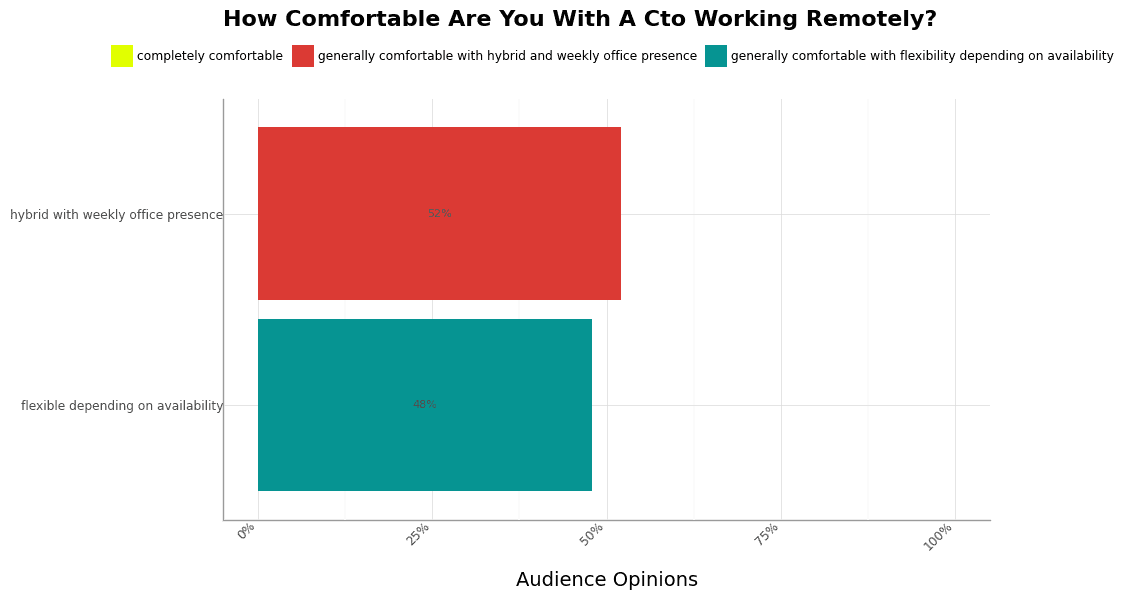
There are both pros and cons to having a CTO who works remotely, and opinions are split into two camps. Just over half (52%) are generally comfortable with a CTO who has a hybrid and weekly office presence, while 48% are generally comfortable with flexibility depending on availability.
Considering that in April 2025, Statista reported that approximately 14% of workers in Great Britain worked exclusively from home and 26% had a hybrid setup, this aligns with broader workforce trends embracing flexibility, suggesting that expectations for CTOs are evolving in line with working norms. It also indicates that effectiveness, not constant physical presence, is becoming the benchmark for leadership in tech.
What Is Your Preferred Way to Find Executive Tech Talent?
53% prefer using startup or tech communities to find executive talent
Preferences for where to find tech talent differ somewhat, with one clearly dominant option:
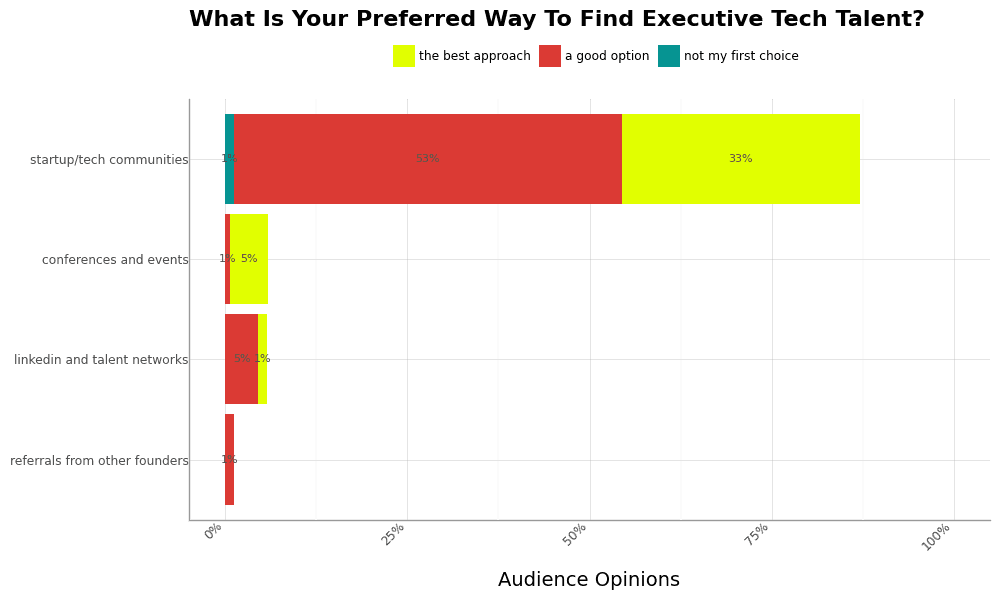
Finding tech talent is not easy, especially considering that, according to the 2025 Talent Shortage survey, IT and data skills have been the hardest to find for the last five years. Our audience has their own ideas about where to look for tech talent, with 53% saying that startup or tech communities are a good option,22% saying this is the best approach, and only 1% saying it’s not their first choice. In contrast, just 5% say conferences and events are the best approach, and 1% say this avenue is a good option.
For 5%, LinkedIn and talent networks are a good option. 1% say this is the best approach, and just 1% say referrals from other founders are a good option. It’s evident that in a challenging hiring landscape, most of our audience sees the highest potential in tapping into communities, far outweighing more traditional recruitment avenues that were relied on in the past.
What Level of Involvement Do You Expect from a CTO in Hiring Developers?
29% definitely expect CTOs to collaborate on interviews and selection when hiring developers
The expectations of a CTO when hiring developers differ among our audience:
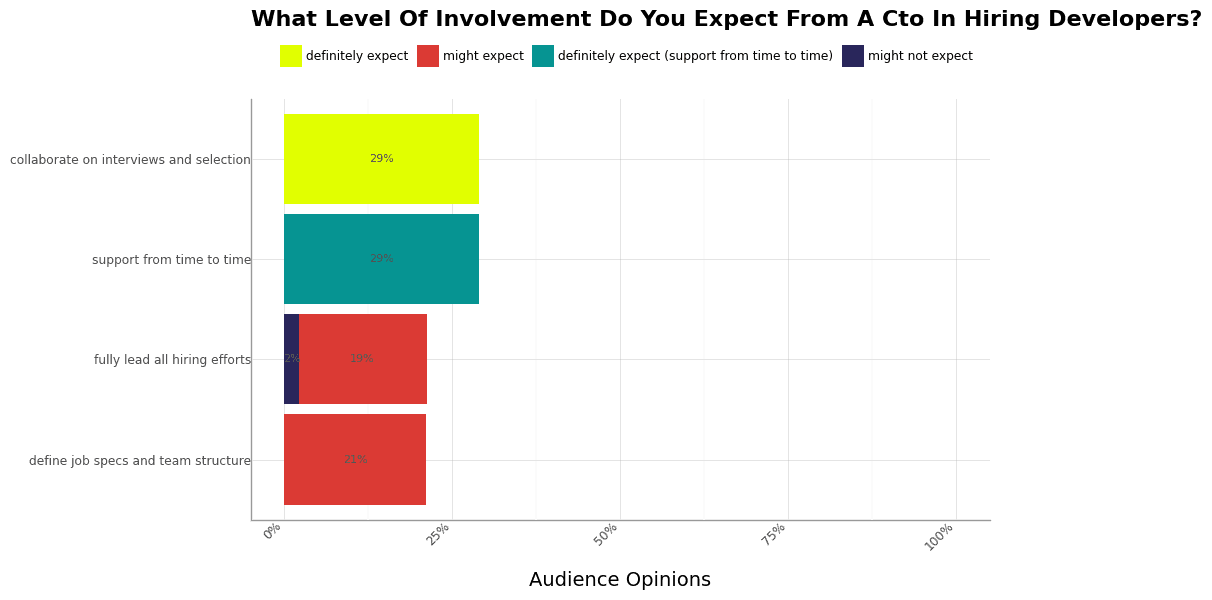
A CTO's role often involves offering guidance and expertise, and for our audience, 29% definitely expect their involvement in collaborating on interviews and selection when hiring developers. Another 29% definitely expect support from time to time, while 21% might expect assistance in defining job specs and team structure.
Interestingly, 19% expect their CTOs to fully lead all hiring efforts but 2% might not expect this at all, showing that there’s a small percentage who may prefer to handle recruitment independently or rely on other parts of their organisation for hiring decisions.
Which Industries Should Your CTO Have Experience In?
74% agree it's absolutely essential CTOs have experience in fintech or regulated tech
CTOs' experience needs to encompass specific industries:
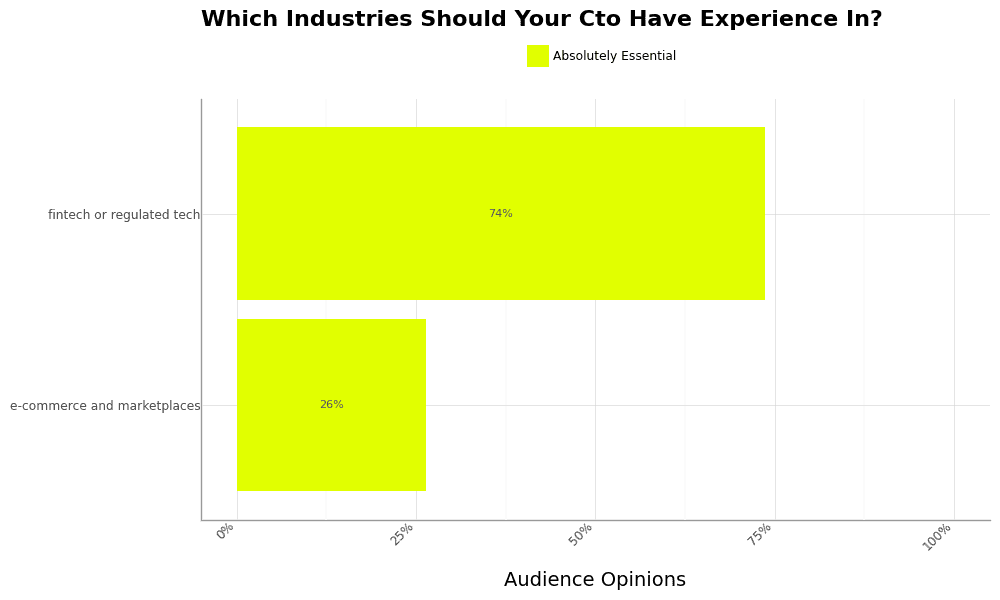
Of our audience, 74% say that it’s absolutely essential that a CTO has experience in fintech or regulated tech. The UK is currently a leading fintech hub that attracts $3.6 billion in investment annually, so the demand for experience in this sector makes sense.
It’s also understandable that 26% say that it's absolutely essential that a CTO has experience in e-commerce and marketplaces, as the UK has the third-largest eCommerce market in the world.
What KPIs Would You Use to Evaluate a CTO's Success?
For 33%, team retention and engagement are crucial KPIs for measuring a CTO's success
KPIs play a crucial role in evaluating how successful a CTO is in specific areas:

Using Key Performance Indicators (KPIs) is an excellent way to evaluate a CTO's success rate, and for our audience, there’s a three-way split as to what they consider crucial, important, and minor. 33% say that team retention and engagement is a crucial KPI, 33% say alignment with business strategy is important, and the remaining 33% say that system uptime and performance is a minor measure of success.
This suggests that businesses view a CTO's impact through a balanced lens, valuing leadership, strategic alignment, and technical performance differently depending on their specific priorities and stage of growth.
How Involved Should Your CTO Be in Company Planning?
72% say CTOs should be involved in company planning, but only for tech matters
Company planning is not an area where CTOs' involvement is generally required:
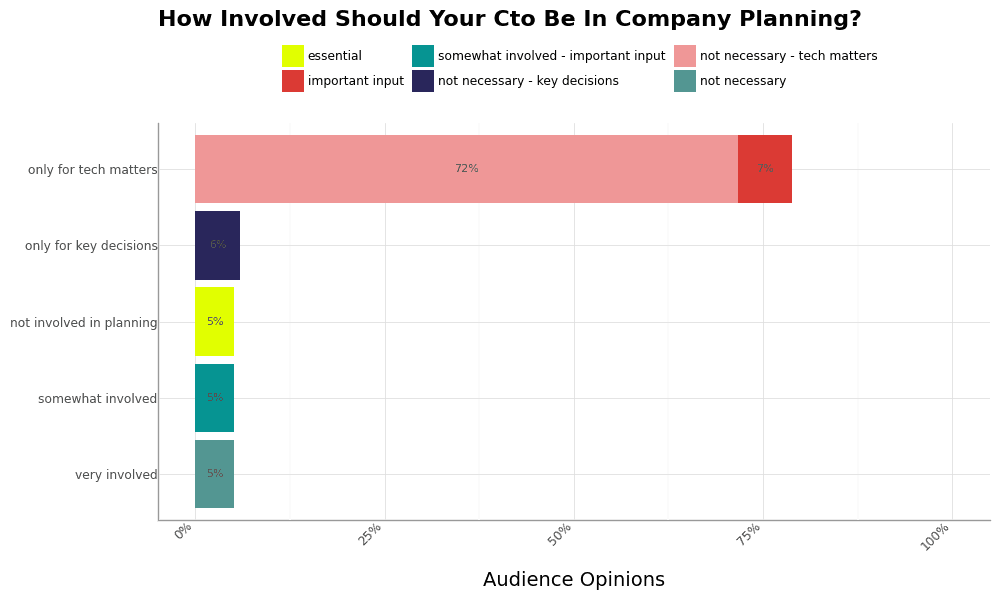
The data clearly shows that CTOs' involvement in company planning is largely unnecessary, unless it's for tech matters. 72% are of this opinion, which correlates with members of the Forbes Technology Council who say that, in this regard, CTOs are uniquely positioned to drive momentum in ways that others can’t. Another 7% agree that CTOs' input for tech matters is important, pushing the number up to a combined 79% who agree on the level of involvement required.
Conversely, just 6% say that CTO involvement in company planning is not necessary unless its for key decisions, while the remaining 15% are split three ways, with 5% saying it’s essential they are not involved in planning, 5% saying it’s not necessary that they are very involved, and the remaining 5% saying they should be somewhat involved as they can offer important input.
This makes it clear where CTOs' input is most valued and how they contribute to company planning.
Methodology
Sourced from an independent sample of 74,404 UK business leader opinions across X, Reddit, TikTok, LinkedIn, Threads, and BlueSky using Artios. Responses are collected within a 50% confidence interval and a 5% margin of error. Engagement estimates how many people in the location are participating. Demographics are determined using multiple features while preserving privacy. Results are derived from opinions expressed online, not actual questions answered by people in the sample.
About the representative sample:
- 52% are between the ages of 35 and 64.
- 57% identify as female and 43% as male.